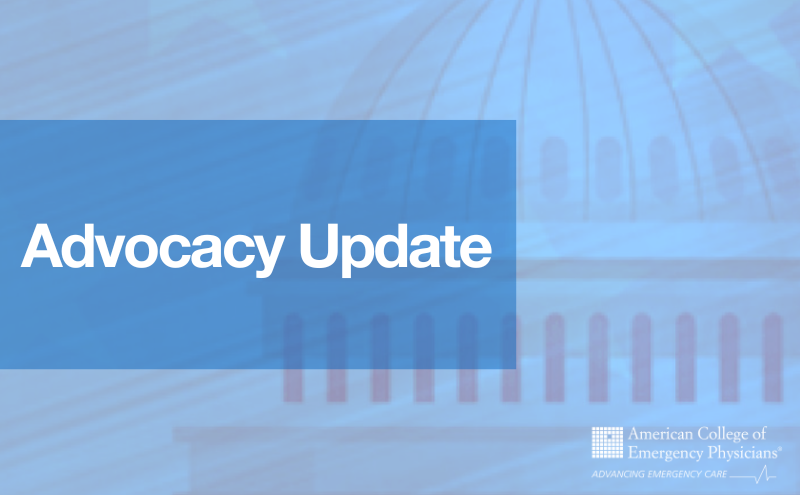In July, ACEP took steps to ramp up your support services during career transitions, called for fixes to the flawed surprise billing law implementation, and successfully advocated for a significant funding boost that will help prioritize alternatives to opioids and improve access to medication-assisted treatment.
We also supported a series of legislative efforts, from both Democrats and Republicans, to protect patients and improve access to care.
Protecting you during career transitions
Many emergency physicians are impacted by APP closing. ACEP offers support services during career transitions that include counseling, contract review, resources to form an independent group, and more. Our new policy statement strengthens and solidifies our position on the corporate practice of medicine.
Outlining Challenges with Surprise Billing Law Implementation
ACEP and the Emergency Department Practice Management Association (EDPMA) wrote the Senate Health, Education, Labor and Pensions (HELP) Committee to outline recommendations to improve the flawed implementation of the No Surprises Act and make sure the law is enacted as Congress intended.
Advocating for patients and care teams
Successful ACEP advocacy led to an additional $7.4 million in Substance Abuse and Mental Health Services Administration (SAMHSA) grant funding for Emergency Department Alternative to Opioids (ALTO) programs and an additional $18.4 million for programs providing Medication-Assisted Treatment (MAT).
ACEP is on the record this month supporting legislation from both Democrats and Republicans. Some of these include:
- The “Drug Shortages Prevention and Quality Improvement Act,” introduced by Sen. Ben Cardin (D-MD), to address root causes of drug shortages and give the U.S. Food and Drug Administration (FDA) additional tools to mitigate them.
- The “Getting Over Lengthy Delays in Care As Required by Doctors (GOLD CARD) Act,” introduced by Rep. Michael Burgess, MD (R-TX), to exempt qualifying health care providers from prior authorization requirements under Medicare Advantage plans.
- The “Promoting Access to Treatment and Housing (PATH) Act,” introduced by Rep. Adam Schiff (D-CA) to expand mental health and substance use disorder (SUD) treatment to individuals experiencing homelessness.
- The “Gun Violence as a Public Health Emergency Act,” introduced by Rep. Robin Kelly (D-IL), to require the Department of Health and Human Services (HHS) and Centers for Disease Control and Prevention (CDC) to issue an annual report on firearm violence. ACEP input was informed by our policies on Firearm Safety and Injury Prevention.
- The “Expanding Nationwide Access to Test Strips Act,” introduced by Sen. Cory Booker (D-NJ), to expand access to and decriminalize possession of drug test strips that can detect the presence of fentanyl, xylazine, or other dangerous adulterants.
Learn more about the National Emergency Medicine Political Action Committee (NEMPAC) and federal advocacy initiatives here.
As a member of ACEP, your membership dues make our advocacy possible. Did you see how ACEP was fighting for you last month? Thank you for your continued support.
Related:
- Escalate your engagement and advocacy through our new Advocacy Leaders Program. Complete this short form for more information.
- Join the 911 Grassroots Network for weekly updates and information on taking action to reach your elected officials.



